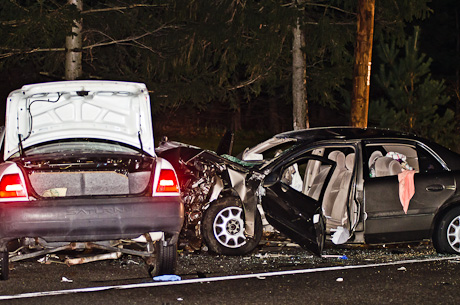
It is a driver's responsibility to operate his vehicle in a safe manner, an appeals court has ruled in rejecting a claim by a woman seriously injured in an accident Dec. 8, 2016, in the Town of Stafford that the girlfriend who was texting with the other driver should be held liable.
Carmen Vega, of Le Roy, who was injured in the accident sued the family of Collin Crane,17, the other driver, who died as a result of the crash, and his girlfriend, Taylor Cratsley.
Genesee County Supreme Court Judge Emilio Colaiacovo dismissed Vega's claim in April 2017. The Appellate Division of the Fourth Judicial Department upheld that ruling.
"The court properly concluded that defendant had no duty to refrain from sending text messages to decedent," the appeals court wrote in its ruling.
A State Police investigation found that there was no evidence Crane tried to take evasive action after his car crossed the center line on Route 33 in Stafford, "suggesting that he was likely distracted."
An investor reported, "The cellular phone activity may have been the source of the distraction."
Vega's attorneys argued that Cratsley knew or should have known that Crane was driving and therefore should not have been sending him text messages.
Cratsley told police and later stated in an affidavit, that she was unaware Crane was driving at the time of the accident.
"Mrs. Cratsley added that often -- when the decedent was returning from work -- a family member would pick him up and drive him home," according to a court document. "Cratsley testified at her deposition that she never expected nor asked the Decedent to send her text messages or read text messages while driving. None of the text messages produced contradict Mrs. Cratsley's testimony."
Citing previous case law, the court said, "A defendant generally has no duty to control the conduct of third persons so as to prevent them from harming others, even where as a practical matter defendant can exercise such control."
Such a person, the court said, has no direct knowledge of what the driver is doing and less ability to control the actions of the driver.
"The same driver has complete control over whether to allow the conduct of the remote sender to create a distraction," the court wrote.
The text sender's actions, the court said, are as "innocuous" as a billboard by the side of the road, a sign outside a church, or a lemonade stand, all of which are intended to grab a driver's attention. To rule the text sender could be held liable would mean those responsible for these other distractions could also be held liable.
"We conclude," the court wrote, "the defendant owed no duty to the plaintiff to refrain from the conduct alleged, and therefore that she cannot be held liable for such conduct."
Photo: File photo.
